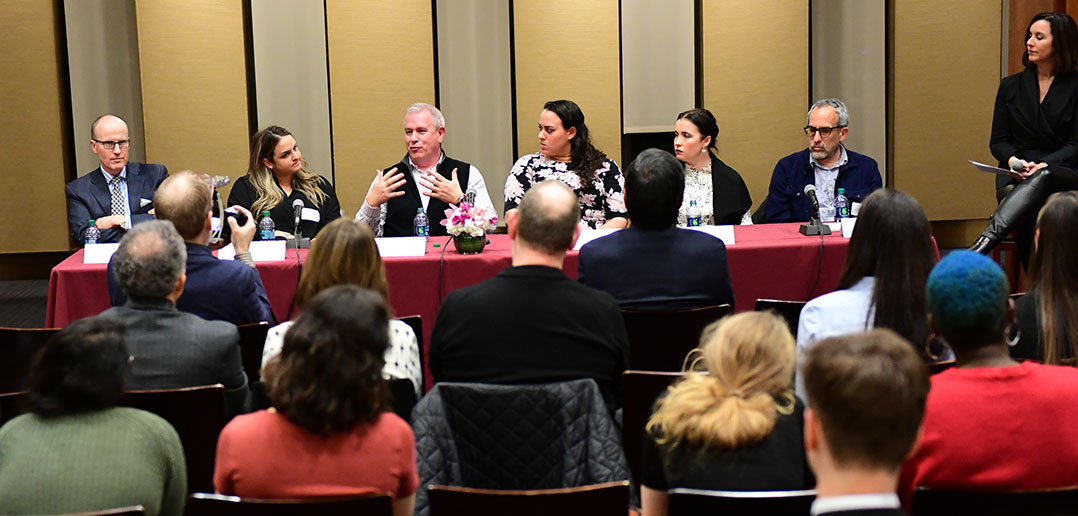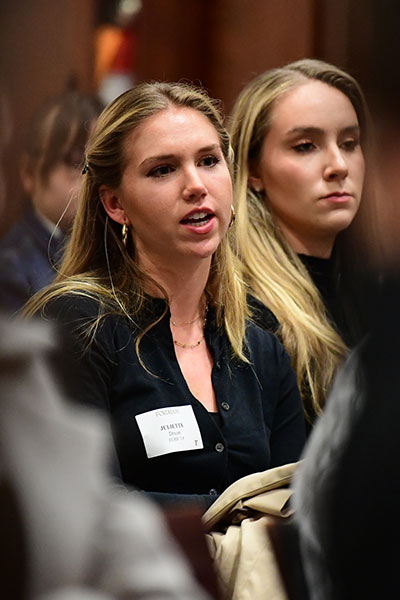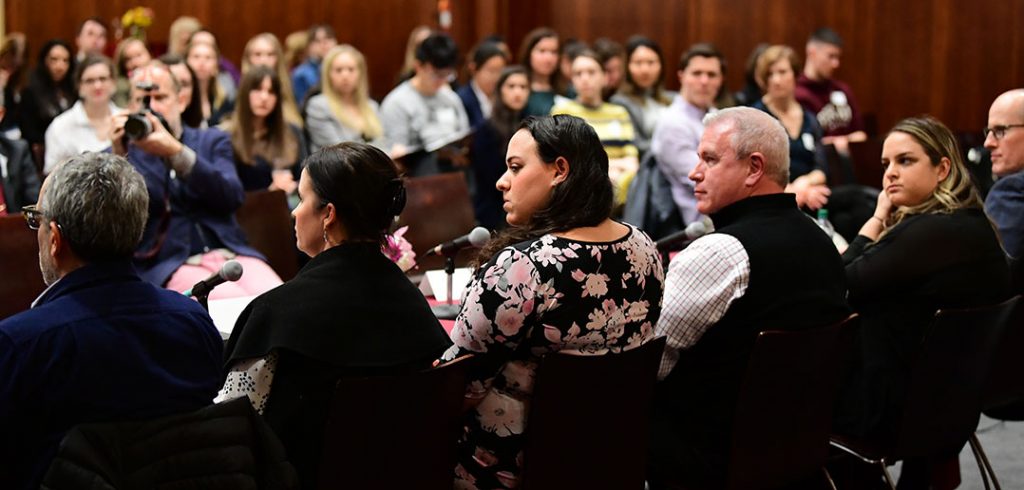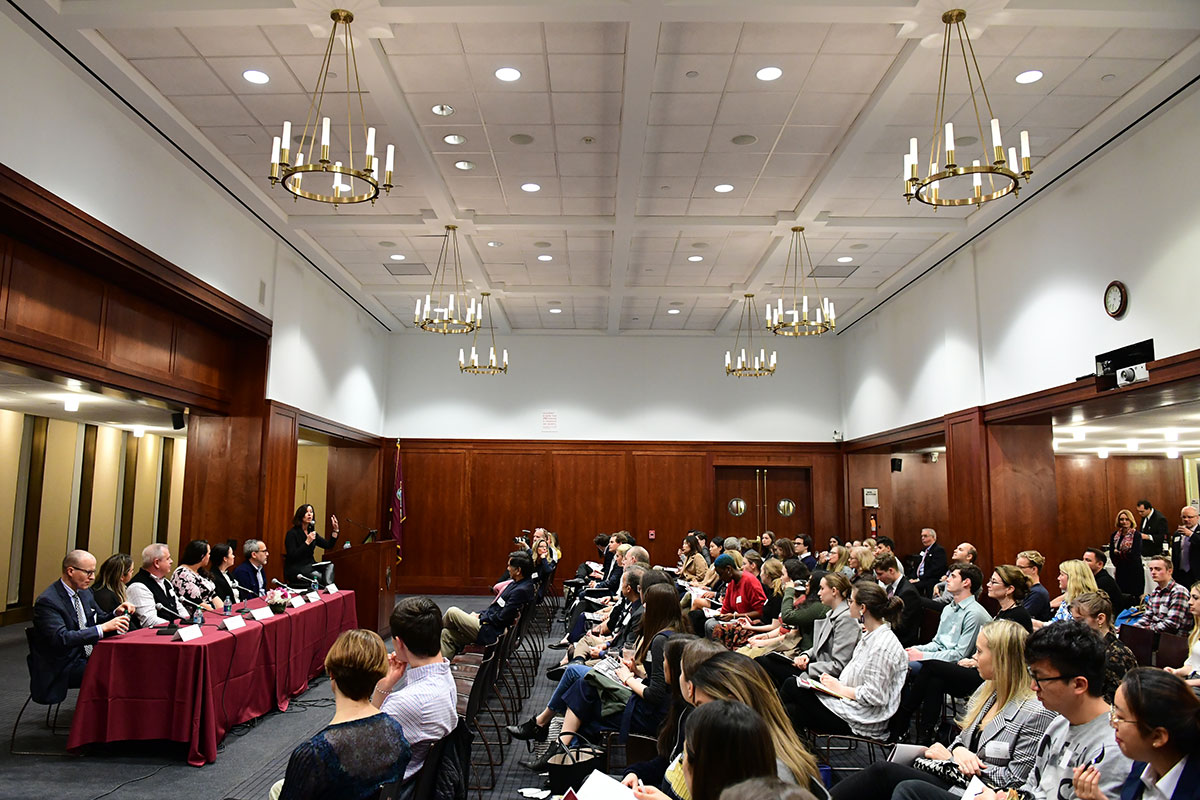Fordham alumni and parents weighed in on these and other questions at the annual Parent Professional Panel on Feb. 5 at Fordham’s Lincoln Center campus. The event, facilitated by Parents’ Leadership Council Chair Donna Morris, PAR ’19, featured professionals in healthcare, entertainment, sports journalism, digital marketing and design, and finance who shared their insights on interviewing with an audience of more than 150 students and alumni.
Panelist John Murphy, GABELLI ’90, chief financial officer and executive vice president at Adobe, said that he appreciates job candidates who can articulate why a position makes sense for their career plan. “When someone has researched the company and the job and they can explain how that fits with what they want to do long term, you can have a better dialogue,” he said.
The panel also included Martin Cummins, FCRH ’93, a freelance location scout for HBO and Netflix; Ashley Fugazy, FCRH ’00, a talent production supervisor for the YES Network; Maxxie Goldstein, GABELLI ’13, CEO and founder of the digital ad company Meyvyn; Ian Parney, M.D., Ph.D., PAR ’22, a neurosurgeon and cancer researcher at the Mayo Clinic; and Morgan Vazquez, FCRH ’13, a vice president at BNY Mellon.
Leadership and Time Management
It’s one thing to show academic strength, but leadership, they all agreed, is a key characteristic that makes job candidates stand out to prospective employers. “In an interview, highlight what you are doing on campus and in your communities to show that you can be an influencer,” Vazquez said.
The panelists encouraged students to use extracurricular activities to their advantage in interviews, not only as a conversation starter but also as a way to convey what they can bring to the table. While commitments like varsity sports can make juggling an internship difficult, panelists agreed that employers will find a way to make it work for exceptional candidates.“We hire a lot of athletes because most of them are highly effective at time management,” said Morris, chief human resources officer at Adobe. “They also overcome loss quickly because they’re used to the fact that they’re not always winning. And business is a team sport.”
ROTC cadet James Parney, a first-year Fordham College at Rose Hill planning to major in international political economy, said this advice resonated. “I have very limited time, which would make an internship hard. However, I would like to gain that valuable experience. Finding a way to make this possible is very important.”

Openness to Change, Discovering Your Passion
The panelists advised soon-to-be graduates to approach their careers with an openness to continue learning, and to explore courses, clubs, and job experiences that are outside of their comfort zones.
Murphy said he originally wanted to be an architect but shifted gears after taking an accounting course at Fordham. “I learned that it’s the universal language of business,” he said. After working in the field and later in mergers and acquisitions, he went on to his current role as CFO at Adobe.Vazquez planned on a career in financial services but after she graduated, she realized that sitting at a desk crunching numbers wasn’t something she really enjoyed. Her current position as vice president of campus strategy and pipeline development at BNY Mellon is a perfect hybrid that combines her financial services expertise with her love of working with people.
Parney, a physician-researcher at the Mayo Clinic, added that it’s critical to do something you feel passionately about. “I’m grateful to have a job I love,” he said. “I enjoy the science and technical aspects of medicine, but the thing I find most rewarding is the ability to help people.”
Professionals who love what they do find ways to integrate their work and the other aspects of their lives, but the panelists admitted that managing a career and family can, at times, be challenging. Their suggestions? Budgeting time for yourself and learning to set boundaries.

During a Q&A following the discussion, Juliette Dixon, a Fordham College at Rose Hill senior, asked the panelists for advice on how she can learn about a company’s culture. Their suggestions included observing employee interactions in the lobby, checking reviews of the company on Glassdoor, and using interview time to ask why people enjoy working at the firm. They also emphasized the power of networking with Fordham alumni.
“The biggest takeaway,” Dixon said later, was knowing that she and her fellow students could “lean on our fellow Fordham alums, with whom we can ask such questions and expect honest answers.”


